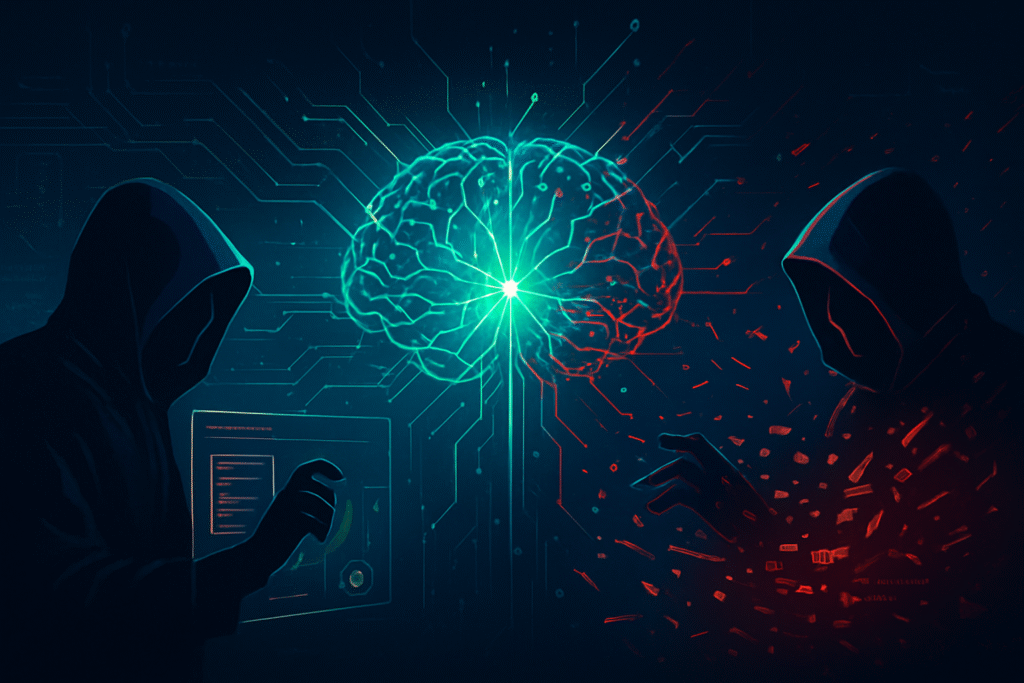
As the 2025 holiday shopping season looms, consumers and businesses alike are facing an unprecedented wave of cyber threats, meticulously crafted and amplified by the pervasive power of artificial intelligence. The Federal Bureau of Investigation (FBI) and the Cybersecurity and Infrastructure Security Agency (CISA) have issued stark warnings, highlighting how scammers are leveraging cutting-edge AI to create highly convincing fraudulent schemes, making the digital marketplace a treacherous landscape. These advisories, building on insights from the late 2024 and early 2025 holiday periods, underscore a significant escalation in the sophistication and impact of online fraud, demanding heightened vigilance from every online participant.
The immediate significance of these warnings cannot be overstated. With global consumer losses to scams soaring past $1 trillion in 2024, and U.S. consumer losses reaching $12.5 billion in 2023—a 22% increase from 2022—the financial stakes are higher than ever. As AI tools become more accessible, the barrier to entry for cybercriminals lowers, enabling them to launch more personalized, believable, and scalable attacks, fundamentally reshaping the dynamics of holiday season cybersecurity.
The AI-Powered Arsenal: How Technology is Being Exploited
The current surge in holiday shopping scams is largely attributable to the sophisticated exploitation of technology, with AI at its core. Scammers are no longer relying on crude, easily detectable tactics; instead, they are harnessing AI to mimic legitimate entities with startling accuracy. This represents a significant departure from previous approaches, where poor grammar, pixelated images, and generic messaging were common red flags.
Specifically, AI is being deployed to create highly realistic fake websites that perfectly clone legitimate retailers. These AI-crafted sites often feature deep discounts and stolen branding, designed to deceive even the most cautious shoppers. Unlike older scams, which might have been betrayed by subtle misspellings or grammatical errors, AI-generated content is virtually flawless, making traditional detection methods less effective. Furthermore, AI enables the creation of highly personalized and grammatically correct phishing emails and text messages (smishing), impersonating retailers, delivery services like FedEx (NYSE: FDX) or UPS (NYSE: UPS), financial institutions, or even government agencies. These messages are tailored to individual victims, increasing their believability and effectiveness.
Perhaps most concerning is the use of AI for deepfakes and advanced impersonation. Criminals are employing AI for audio and video cloning, impersonating well-known personalities, customer service representatives, or even family members to solicit money or sensitive information. This technology allows for the creation of fake social media accounts and pages that appear to be from legitimate companies, pushing fraudulent advertisements for enticing but non-existent deals. The FBI and CISA emphasize that these AI-driven tactics contribute to prevalent scams such as non-delivery/non-payment fraud, gift card scams, and sophisticated package delivery hoaxes, where malicious links lead to data theft. The financial repercussions are severe, with the FBI's Internet Crime Complaint Center (IC3) reporting hundreds of millions lost to non-delivery and credit card fraud annually.
Competitive Implications for Tech Giants and Cybersecurity Firms
The rise of AI-powered scams has profound implications for a wide array of companies, from e-commerce giants to cybersecurity startups. E-commerce platforms such as Amazon (NASDAQ: AMZN), eBay (NASDAQ: EBAY), and Walmart (NYSE: WMT) are on the front lines, facing increased pressure to protect their users from fraudulent listings, fake storefronts, and phishing attacks that leverage their brand names. Their reputations and customer trust are directly tied to their ability to combat these evolving threats, necessitating significant investments in AI-driven fraud detection and prevention systems.
For cybersecurity firms like CrowdStrike (NASDAQ: CRWD), Palo Alto Networks (NASDAQ: PANW), and Zscaler (NASDAQ: ZS), this surge in sophisticated scams presents both a challenge and an opportunity. These companies stand to benefit from the increased demand for advanced threat intelligence, AI-powered anomaly detection, and robust identity verification solutions. The competitive landscape for security providers is intensifying, as firms race to develop AI models that can identify and neutralize AI-generated threats faster than scammers can create them. Payment processors such as Visa (NYSE: V) and Mastercard (NYSE: MA) are also heavily impacted, dealing with higher volumes of fraudulent transactions and chargebacks, pushing them to enhance their own fraud detection algorithms and work closely with banks and retailers. The potential disruption to existing products and services is significant, as traditional security measures prove less effective against AI-enhanced attacks, forcing a rapid evolution in defensive strategies and market positioning.
A Broader Shift in the AI Landscape and Societal Impact
The proliferation of AI in holiday shopping scams is not merely a seasonal concern; it signifies a broader shift in the AI landscape, where the technology is increasingly becoming a double-edged sword. While AI promises advancements in countless sectors, its accessibility also empowers malicious actors, creating an ongoing arms race between cyber defenders and attackers. This development fits into a larger trend of AI being weaponized, moving beyond theoretical concerns to tangible, widespread harm.
The impact on consumer trust in online commerce is a significant concern. As scams become indistinguishable from legitimate interactions, consumers may become more hesitant to shop online, affecting the digital economy. Economically, the escalating financial losses contribute to a hidden tax on society, impacting individuals' savings and businesses' bottom lines. Compared to previous cyber milestones, the current AI-driven threat marks a new era. Earlier threats, while damaging, often relied on human error or less sophisticated technical exploits. Today, AI enhances social engineering, automates attack generation, and creates hyper-realistic deceptions, making the human element—our inherent trust—the primary vulnerability. This evolution necessitates a fundamental re-evaluation of how we approach online safety and digital literacy.
The Future of Cyber Defense in an AI-Driven World
Looking ahead, the battle against AI-powered holiday shopping scams will undoubtedly intensify, driving rapid innovation in both offensive and defensive technologies. Experts predict an ongoing escalation where scammers will continue to refine their AI tools, leading to even more convincing deepfakes, highly personalized phishing attacks, and sophisticated bot networks capable of overwhelming traditional defenses. The challenge lies in developing AI that can detect and counteract these evolving threats in real-time.
On the horizon, we can expect to see advancements in AI-powered fraud detection systems that analyze behavioral patterns, transaction anomalies, and linguistic cues with greater precision. Enhanced multi-factor authentication (MFA) methods, potentially incorporating biometric AI, will become more prevalent. The development of AI-driven cybersecurity platforms capable of identifying AI-generated content and malicious code will be crucial. Furthermore, there will be a significant push for public education campaigns focused on digital literacy, helping users identify subtle signs of AI deception. Experts predict that the future will involve a continuous cat-and-mouse game, with security firms and law enforcement constantly adapting to new scam methodologies, emphasizing collaborative intelligence sharing and proactive threat hunting.
Navigating the New Frontier of Online Fraud
In conclusion, the rise of AI-powered holiday shopping scams represents a critical juncture in the history of cybersecurity and consumer protection. The urgent warnings from the FBI and CISA serve as a stark reminder that the digital landscape is more perilous than ever, with sophisticated AI tools enabling fraudsters to execute highly convincing and damaging schemes. The key takeaways for consumers are unwavering vigilance, adherence to secure online practices, and immediate reporting of suspicious activities. Always verify sources directly, use secure payment methods, enable MFA, and be skeptical of deals that seem too good to be true.
This development signifies AI's mainstream deployment in cybercrime, marking a permanent shift in how we approach online security. The long-term impact will necessitate a continuous evolution of both technological defenses and human awareness. In the coming weeks and months, watch for new advisories from cybersecurity agencies, innovative defensive technologies emerging from the private sector, and potentially legislative responses aimed at curbing AI-enabled fraud. The fight against these evolving threats will require a collective effort from individuals, businesses, and governments to secure the digital future.
This content is intended for informational purposes only and represents analysis of current AI developments.
TokenRing AI delivers enterprise-grade solutions for multi-agent AI workflow orchestration, AI-powered development tools, and seamless remote collaboration platforms.
For more information, visit https://www.tokenring.ai/.





